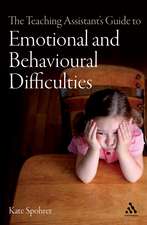Education in Southern Africa: Education Around the World
Editat de Professor Clive Harberen Limba Engleză Paperback – 23 sep 2015
Din seria Education Around the World
- 8%
 Preț: 315.17 lei
Preț: 315.17 lei - 8%
 Preț: 315.17 lei
Preț: 315.17 lei - 7%
 Preț: 320.85 lei
Preț: 320.85 lei - 7%
 Preț: 320.85 lei
Preț: 320.85 lei - 18%
 Preț: 315.33 lei
Preț: 315.33 lei - 18%
 Preț: 315.17 lei
Preț: 315.17 lei - 13%
 Preț: 256.12 lei
Preț: 256.12 lei - 37%
 Preț: 914.95 lei
Preț: 914.95 lei - 13%
 Preț: 316.11 lei
Preț: 316.11 lei - 8%
 Preț: 319.44 lei
Preț: 319.44 lei - 8%
 Preț: 316.11 lei
Preț: 316.11 lei - 8%
 Preț: 315.17 lei
Preț: 315.17 lei - 8%
 Preț: 316.11 lei
Preț: 316.11 lei - 37%
 Preț: 187.87 lei
Preț: 187.87 lei - 43%
 Preț: 631.21 lei
Preț: 631.21 lei - 43%
 Preț: 727.31 lei
Preț: 727.31 lei - 43%
 Preț: 631.21 lei
Preț: 631.21 lei - 44%
 Preț: 187.30 lei
Preț: 187.30 lei - 37%
 Preț: 910.69 lei
Preț: 910.69 lei - 37%
 Preț: 917.83 lei
Preț: 917.83 lei - 37%
 Preț: 912.59 lei
Preț: 912.59 lei - 37%
 Preț: 916.85 lei
Preț: 916.85 lei - 36%
 Preț: 172.36 lei
Preț: 172.36 lei - 36%
 Preț: 171.32 lei
Preț: 171.32 lei - 12%
 Preț: 234.20 lei
Preț: 234.20 lei - 8%
 Preț: 318.95 lei
Preț: 318.95 lei
Preț: 313.74 lei
Preț vechi: 342.26 lei
-8% Nou
Puncte Express: 471
Preț estimativ în valută:
60.03€ • 62.68$ • 49.69£
60.03€ • 62.68$ • 49.69£
Carte disponibilă
Livrare economică 15-29 martie
Preluare comenzi: 021 569.72.76
Specificații
ISBN-13: 9781474235150
ISBN-10: 1474235158
Pagini: 280
Dimensiuni: 156 x 234 x 15 mm
Greutate: 0.45 kg
Editura: Bloomsbury Publishing
Colecția Bloomsbury Academic
Seria Education Around the World
Locul publicării:London, United Kingdom
ISBN-10: 1474235158
Pagini: 280
Dimensiuni: 156 x 234 x 15 mm
Greutate: 0.45 kg
Editura: Bloomsbury Publishing
Colecția Bloomsbury Academic
Seria Education Around the World
Locul publicării:London, United Kingdom
Caracteristici
Authoritative handbook to education in Southern Africa today, written by leading international education experts
Notă biografică
Clive Harber is Emeritus Professor of International Education at the University of Birmingham, UK, and Honorary Professor of Education at the University of South Africa, Pretoria, South Africa.
Cuprins
Series Editor's Preface, Colin Brock (University of Durham, UK)Introduction: Education in Southern Africa: Patterns and Issues, Clive Harber (University of Birmingham, UK and University of South Africa, South Africa)1. Botswana: Aspects of General Education, Richard Tabulawa (University of Botswana, Botswana) and Nkobi O. Pansiri (University of Botswana, Botswana)2. Lesotho: Organization, Structures and Challenges, Mapheleba Lekhetho (University of South Africa, South Africa)3. Madagascar: From Political Divisionism to Unified Development, Carrie Antal (USAID, Rwanda) and Romain Kléber Ndrianjafy (Ministry of Education, Madagascar)4. Malawi: Contemporary and Critical Issues, Gregory Kamwendo (University of KwaZulu-Natal, South Africa)5. Mozambique: Binding Quantitative and Qualitative Goals, Feliciano Chimbutane (Universidade Eduardo Mondlane, Mozambique)6. Namibia: An Overview of System Reform, Gilbert N. Likando (University of Namibia, Namibia) and Charl Wolhuter (North-West University, South Africa)7. South Africa: Educational Reform - Curriculum, Governance and Teacher Education, Vusi S. Mncube (University of South Africa, South Africa) and Nomanesi Madikizela-Madiya (University of South Africa, South Africa)8. South Africa: Making Post-Apartheid Rights into Realities, Shireen Motala (University of Johannesburg, South Africa)9. Swaziland: Access, Quality and Relevance, Edmund Zizwe Mazibuko (University of Swaziland, Swaziland)10. Zimbabwe: From Education Reform to Political Instability, Aaron T. Sigauke (University of New England, Australia)Index
Recenzii
Given that too high a percentage of scholarly work on sub-Saharan Africa is produced by non-Africans, the editors of [this book] should be lauded because nearly all the authors are African ... [The book] provide[s] a useful raid on what was largely unarticulated and so help[s] to fill a gap in the scholarly literature.
Clive Harber has done his readers a real service in bringing together an array of established and new Southern African authors to provide us with new insights into both familiar and less well-documented national cases. The book is an invaluable addition to the comparative education literature.
Much has been achieved by education throughout Southern Africa in recent decades, while much also remains to be done in this diverse and rapidly changing region. This collection of well-informed and insightful analyses provides readers with valuable, carefully contextualised and locally grounded assessments of key educational achievements and challenges across the nine countries that are examined.
This book covers a wide spectrum of issues on formal primary and secondary education in nine southern African countries, including the contexts, access and nature of provision, curriculum, teaching methods, quality of education, teacher education, school organisation, teacher professionalism, HIV/AIDS and gender. The peoples, economies, politics, cultures and education systems of these countries are interrelated. The region currently experiences increased university student mobility, particularly into South Africa as the biggest and most developed economy therein. This book will provide students and academics a rich one-stop source for comparative education purposes. The book provides a good balance of analysis between achievements that deserve to be celebrated, such as increased access and gender equalisation, and issues that still need a lot more attention, such as poor organisation, teacher unprofessionalism and uneven quality of education.
Clive Harber has done his readers a real service in bringing together an array of established and new Southern African authors to provide us with new insights into both familiar and less well-documented national cases. The book is an invaluable addition to the comparative education literature.
Much has been achieved by education throughout Southern Africa in recent decades, while much also remains to be done in this diverse and rapidly changing region. This collection of well-informed and insightful analyses provides readers with valuable, carefully contextualised and locally grounded assessments of key educational achievements and challenges across the nine countries that are examined.
This book covers a wide spectrum of issues on formal primary and secondary education in nine southern African countries, including the contexts, access and nature of provision, curriculum, teaching methods, quality of education, teacher education, school organisation, teacher professionalism, HIV/AIDS and gender. The peoples, economies, politics, cultures and education systems of these countries are interrelated. The region currently experiences increased university student mobility, particularly into South Africa as the biggest and most developed economy therein. This book will provide students and academics a rich one-stop source for comparative education purposes. The book provides a good balance of analysis between achievements that deserve to be celebrated, such as increased access and gender equalisation, and issues that still need a lot more attention, such as poor organisation, teacher unprofessionalism and uneven quality of education.











